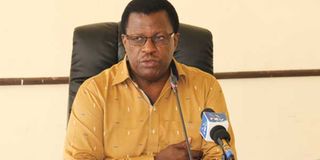At least 300 officers who failed to submit M-Pesa details to face the sack

National Police Service Commission Chairman Johnstone Kavuludi during the vetting of police officers in Mombasa on May 30, 2016. He said at least 300 traffic police officers who have failed to submit their M-Pesa and bank details to facilitate their vetting will be removed from the service. PHOTO | WACHIRA MWANGI | NATION MEDIA GROUP
What you need to know:
- The commission has targeted 598 from the Coast, Western and Nyanza regions in the first phase and a total of 2,500 nationally.
- He said the corrupt policemen have gone on an “extortion frenzy’’ and raised their daily collections by 100 per cent.
At least 300 traffic police officers who have failed to submit their M-Pesa and bank details to the National Police Commission to facilitate their vetting will be removed from the service.
NPSC Chairman Johnston Kavuludi said the officers from the Coast region and other parts of the country had been given time to submit their documents but had failed to do so.
“The commission has no alternative but to automatically remove the officers from the service for failing to submit those documents, which was a mandatory requirement for their vetting,” Mr Kavuludi said on the sixth day of exercise at the Kenya School of Government in Mombasa on Monday.
The officers who would be axed would be paid their dues, he added.
The traffic officers were required to have submitted their documents by the end of March, ahead of the vetting, which kicked off on May 24 and ends on June 4.
The commission has targeted 598 from the Coast, Western and Nyanza regions in the first phase and a total of 2,500 nationally.
Mr Kavuludi’s team hopes to interview 238 officers from the Coast by Saturday.
And giving a briefing on the sidelines of the interviews, Mr Kavuludi said that corrupt traffic police officers from the region, before the start of the vetting, had changed tactics in collecting bribes from public vehicles.
He said the corrupt policemen have gone on an “extortion frenzy’’ and raised their daily collections by 100 per cent.
“It has come to our notice that police have gone back to collecting bribes with a vengeance since we began vetting them. They have changed tack. They now use certain touts whom they place at strategic bus stages and garages to collect their daily bribes.”
According to the NPSC boss, the officers tell their 'victims' that they will be sacked either way and so they must collect bribes.
“We have been told that the Sh100 bribe has now gone up to Sh1,000 and the Sh1,000 has gone up to Sh5,000. This mutation of tactics is very dangerous,” Mr Kavuludi observed.
DO NOT OFFER BRIBES
The information, he added, had been conveyed to Inspector-General Joseph Boinnet at the weekend, who ordered that the officers be dealt with.
He added that investigations by the commission had shown that two out of three junior officers in the traffic department have godfathers whom they depend on for protection after “placement”.
The wide network exposed during the interviews in which senior police officers are sent huge amounts of money by their juniors, through M-Pesa, was the reason for such placements.
“We have established that senior officers extort huge sums of money from the juniors for the favours, including recruitment, placement and promotion.”
He added he had personally received calls from high-ranking officers asking him to post junior officers to roadblocks or weigh-bridges, which are regarded as lucrative positions and warned police officers against buying their way into the traffic department.
The commission's boss said disciplinary process would be taken those officers found to have engaged in corruption, intimidating motorists, violence, gender issues and human rights abuse.
He said: “This is a quasi-judicial commission with powers to investigate and prosecute, but depending on the nature of the case we could refer others to the Directorate of Criminal Investigations, the Ethics and Anti-Corruption Commission, Director of Public Prosecution or other institutions.”
Mr Kavuludi urged motorists and the public to fight corruption by refusing to give bribes and being compromised by rogue officers.
Tuesday's session will see more officers of the ranks of constable and corporal vetted.






